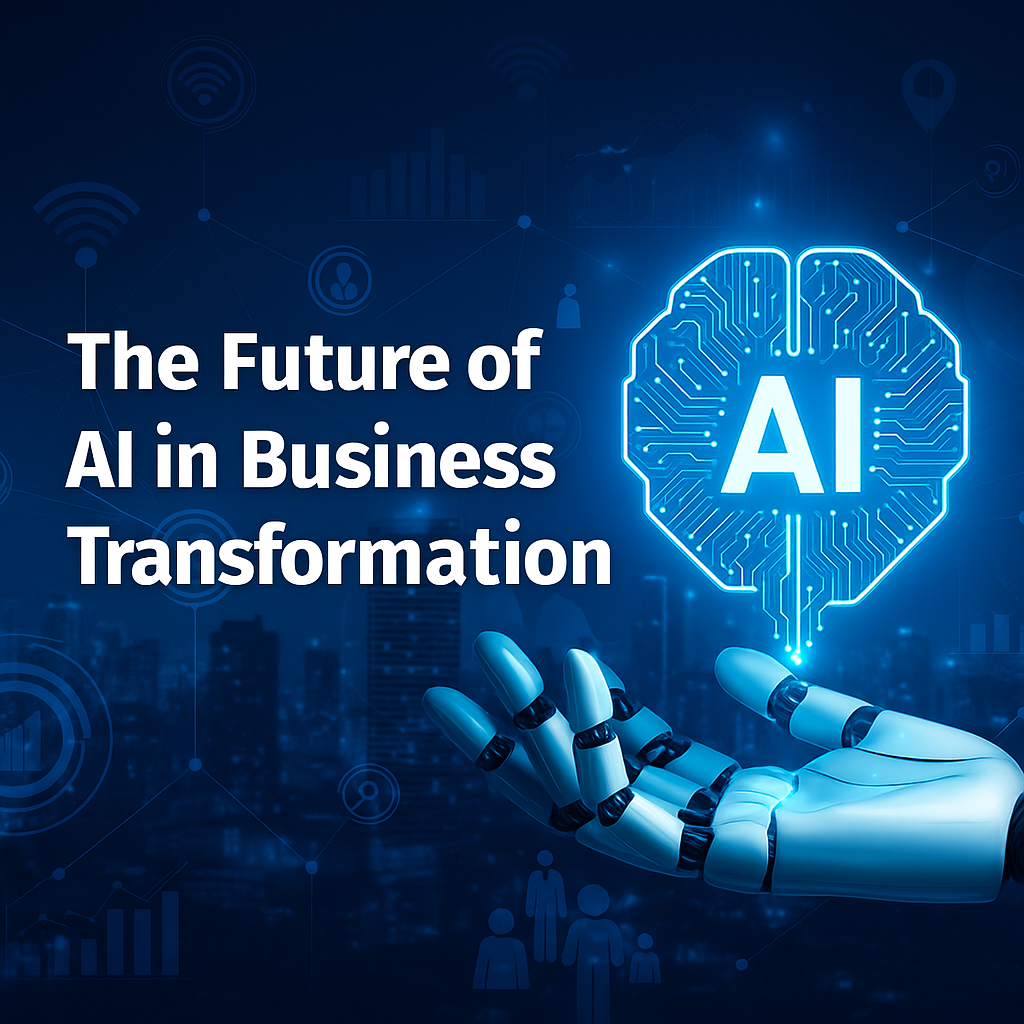Introduction
Artificial Intelligence (AI) is no longer a concept reserved for sci-fi movies or distant possibilities—it’s a transformative reality shaping the future of business today. From automating routine workflows to delivering predictive insights, AI is at the heart of modern digital transformation. Its impact is not only enhancing operational efficiency but also redefining how businesses interact with customers, make decisions, and innovate.
In this blog, we explore how AI is revolutionizing business operations and creating fresh avenues for competitive advantage.
1. AI-Powered Automation: Boosting Efficiency and Accuracy
AI excels at automating repetitive, rules-based tasks—freeing up human resources for higher-level strategic functions. This leads to improved operational speed, reduced costs, and fewer errors.
🔹 Real-World Example:
Retail companies are deploying AI-driven chatbots to handle thousands of customer queries around the clock. These virtual agents reduce wait times, increase satisfaction, and lower customer support costs.
Key Areas Transformed:
-
Data entry and validation
-
Customer service (chatbots, voice assistants)
-
Invoice and payment processing
-
Supply chain and logistics tracking
2. Smarter Decisions with Predictive Analytics
Machine learning enables systems to analyze vast datasets, detect patterns, and forecast outcomes with high accuracy. This empowers businesses to make proactive, data-informed decisions.
🔹 Real-World Example:
Logistics companies use AI models to predict delivery delays based on traffic, weather, and route history—allowing them to adjust delivery schedules in real-time.
Business Impact:
-
Demand forecasting
-
Inventory optimization
-
Targeted marketing and personalization
-
Risk assessment and mitigation
3. Enhanced Customer Experience and Personalization
AI helps businesses understand customer intent and behavior at a granular level. Tools like sentiment analysis, recommendation engines, and dynamic pricing enable hyper-personalized interactions.
🔹 Real-World Example:
Streaming platforms such as Netflix use AI to analyze viewing patterns and suggest personalized content, enhancing user engagement and retention.
Techniques Used:
-
Behavior prediction
-
Natural language processing (NLP)
-
Recommendation systems
-
Customer segmentation
4. AI-Driven Business Intelligence (BI)
AI augments traditional BI systems by enabling real-time insights from complex, unstructured data. Intelligent dashboards help decision-makers quickly spot trends, anomalies, and performance metrics.
🔹 Real-World Example:
Financial departments use AI tools to automatically flag fraudulent transactions, detect unusual patterns, and provide early warnings of operational risk.
Benefits:
-
Faster reporting and analysis
-
Visual anomaly detection
-
Streamlined decision-making
-
Proactive performance management
5. New Business Models and Innovation Opportunities
AI is enabling entirely new products, services, and business models that were previously unimaginable. From autonomous systems to AI-as-a-Service platforms, the technology is opening doors to bold innovation.
🔹 Real-World Example:
In healthcare, AI is used for remote diagnostics and intelligent triaging—extending medical services to rural and underserved populations.
Emerging Areas:
-
Autonomous vehicles and robotics
-
AI-based diagnostics and therapy
-
Predictive maintenance in manufacturing
-
Smart cities and IoT systems
6. Challenges and Ethical Considerations
While AI offers immense promise, it also introduces critical challenges. Businesses must navigate issues related to fairness, transparency, data privacy, and job displacement.
Key Concerns:
-
Bias in algorithms
-
Data privacy regulations (e.g., GDPR, HIPAA)
-
AI explainability and trust
-
Impact on employment
Organizations must prioritize ethical AI development and create governance frameworks to ensure responsible use.
7. The Road Ahead: Preparing for an AI-Driven Future
As AI technology matures, its role in shaping business strategy will only deepen. The most successful organizations will be those that not only invest in AI tools but also foster a data-first culture and continuous learning mindset.
Strategic Imperatives:
-
Upskilling teams in AI and data literacy
-
Investing in scalable AI infrastructure
-
Embracing agile innovation processes
-
Building cross-functional AI governance teams
Conclusion
AI is not merely an enhancement—it is a transformational catalyst. By embracing AI, businesses can reinvent their operations, unlock breakthrough innovations, and deliver greater value to customers.
As we move into a future increasingly driven by intelligent systems, the question is no longer "Should we adopt AI?" but rather "How can we harness it ethically and strategically to lead the next wave of business transformation?"
📌 Call to Action
Whether you’re starting your AI journey or scaling your implementation, now is the time to assess where AI can create the greatest impact in your organization.


